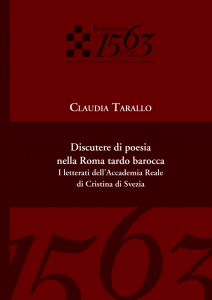Discussing poetry in late Baroque Rome. Men of letters in Christine of Sweden’s Royal Academy
by Claudia Tarallo
In 1674 Christina of Sweden reopened in Palazzo Corsini alla Lungara her Royal Academy, formerly established in 1656. At her court she admitted prelates and poets in order to create an erudite reunion in which she could demonstrate her cultural patronage.
Through specific documents, such as the two manuscripts of the Vatican Library, Ott. lat. 1744 and Ott. lat. 2140, we are able to start our recognition on the history and the features of this important academy: however these survivors documents are not completed and, referring to a little segment of the hole history of the academy, they appear inadequate. In ms. Ott. lat. 1744 we can read the texts of the speeches recited in the Royal Academy from November, 11th 1674 to December, 16th 1675; in ms. Ott. lat. 2140 we find an incomplete and incorrect list of academy’s members of 1674, 1675 and 1679. Royal Academy finished its meeting after the queen’s death in April, 19th 1689: so it’s evident that the documentation gives only partial information. Exploring unpublished letters and other writings we can however increase the framework of our knowledge: in particular we could take advantage of letters of Francesco Redi’s correspondents, such as those of Stefano Pignatelli, dear friend of the Florentine physician and leading member of the Royal Academy in Rome. The member’s list offered by ms. Ott. lat. 2140 exemplifies a certain feature of this academy: the relevant role assumed by Jesuits. Since when Christina arrived in Rome, she was in touch with the most important exponents of the Compagnia di Gesù: Alexander VII in fact put beside her the Jesuit Cardinal Sforza Pallavicino whose literary works were devoted to moral and sacred literature and took as laic point of reference Francesco Petrarca.
To exemplify the new path on which the Italian literature decided to walk in the last quarter of the 17th Century, we could examine a little known poetic anthology arranged by Stefano Pignatelli. He collected in fact only sacred and heroic poetry, expressly stating he wants to avoid erotic texts. His program is certainly expression of the interests of the queen and of all the members of her academy.
Then, looking at the composition of the Royal Academy we noticed a significant presence of Florentine poets. This presence had undoubted consequences on the literary discussions in the Royal Academy: the tight proximity of these poets and of the Queen too to the linguistic ideas expressed by the Florentine Accademia della Crusca is of course a sign of the great influence that the Florentine culture had on Royal Academy’s life and tendencies.
For this reason we decided to analyze the important poetic treatise Arte poetica published by Benedetto Menzini in 1688. With this work Menzini conveys his poetic ideas in order to prepare a manual for the perfect classicistic poet. Ars poetica by Orazio is the starting point of his argument: he declares to write his treatise to reply to Nicolas Boileau’s Art poetique written to counteract the primacy of the Italian Literature. Menzini wants to defend the great Italian literature but to do so it’s necessary to break every bond with the previous baroque literature and rediscover the good canon represented by Petrarca, Tasso and Chiabrera.
Christina of Sweden’s Royal Academy preludes to the foundation of Accademia dell’Arcadia. However the real relation that certainly links these two experiences is not so close as usually is considered. The absolute predominance of sacred and moral themes in the production of the Queen of Sweden’s poets is quite far from the more light, musical, and precious poetry promoted by Crescimbeni during his long and fundamental custodiato. For this reason the phenomenon of this academy of the late Baroque Rome is worth to be studied as whole and not only as an anticipation of the more lasting Arcadia.

Title: Discutere di poesia nella Roma tardo barocca. I letterati dell’Accademia Reale di Cristina di Svezia (Discussing poetry in late Baroque Rome. Men of letters in Christine of Sweden’s Royal Academy)
Author: Claudia Tarallo
Series: Alti Studi sull’Età e la Cultura del Barocco
Publisher: Fondazione 1563 per l’Arte e la Cultura della Compagnia di San Paolo
Year: 2017
Pages: 122 pp.
Language: Italian
Isbn: 9788899808068



